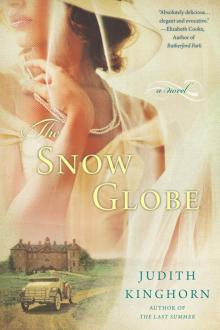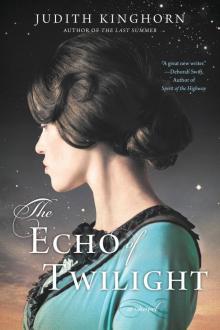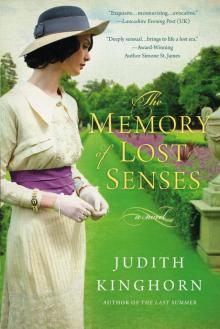- Home
- Judith Kinghorn
The Echo of Twilight
The Echo of Twilight Read online
PRAISE FOR THE NOVELS OF JUDITH KINGHORN
“A gripping tale of family secrets, and a comedy of manners. . . . Historical fiction fans will not want to miss this gem!”
—Renée Rosen, author of White Collar Girl
“An absolutely delicious book . . . elegant and evocative to the last word.”
—Elizabeth Cooke, author of The Gates of Rutherford
“Mysterious, evocative, and deeply sensual . . . this moving story is not to be missed.”
—Simone St. James, RITA Award–winning author of Lost Among the Living
“Lucinda Riley’s readers will enjoy Kinghorn’s manipulation of the story’s timeline, fans of Sarah Jio will adore the novel’s romantic backbone, and historical fiction readers will appreciate Kinghorn’s eye for authentic period details.”
—Booklist
“Kinghorn vividly depicts the turmoil of the postwar period. . . . Those who love the blockbuster show Downton Abbey will find much to enjoy.”
—Historical Novel Society
“A touching, thought-provoking, and compelling read. Kinghorn evokes the years before the war as she skillfully envelops the reader in her imaginative, tragic tale.”
—RT Book Reviews (4½ stars)
“Exquisite . . . a sensual and visual feast of a story.”
—Lancashire Evening Post (UK)
“A glorious read, highly recommended.”
—The Bookseller (UK)
“Judith Kinghorn has beautifully captured the thoughts and feelings of a particular group in a lost generation. . . . Above all a wonderful and heartbreaking love story . . . highly recommended!”
—One More Page (UK)
Also by Judith Kinghorn
The Last Summer
The Memory of Lost Senses
The Snow Globe
BERKLEY
An imprint of Penguin Random House LLC
375 Hudson Street, New York, New York 10014
Copyright © 2017 by Judith Kinghorn
Readers Guide copyright © 2017 by Penguin Random House LLC
Penguin Random House supports copyright. Copyright fuels creativity, encourages diverse voices, promotes free speech, and creates a vibrant culture. Thank you for buying an authorized edition of this book and for complying with copyright laws by not reproducing, scanning, or distributing any part of it in any form without permission. You are supporting writers and allowing Penguin Random House to continue to publish books for every reader.
BERKLEY is a registered trademark and the B colophon is a trademark of Penguin Random House LLC.
Library of Congress Cataloging-in-Publication Data
Names: Kinghorn, Judith, author.
Title: The echo of twilight/Judith Kinghorn.
Description: First edition. | New York: Berkley Books, 2017.
Identifiers: LCCN 2016019604 (print) | LCCN 2016027145 (ebook) | ISBN 9780451472106 (paperback) | ISBN 9780698177864 (ebook) Subjects: | BISAC: FICTION/Historical. | FICTION/Family Life. | FICTION/War & Military.
Classification: LCC PR6111.I59 E28 2017 (print) | LCC PR6111.I59 (ebook) | DDC 823/.92—dc23
LC record available at https://lccn.loc.gov/2016019604
First Edition: January 2017
Cover photographs: woman © Richard Jenkins Photography; sky by John Lund/Getty Images
Cover design by Colleen Reinhart
This is a work of fiction. Names, characters, places, and incidents either are the product of the author’s imagination or are used fictitiously, and any resemblance to actual persons, living or dead, business establishments, events, or locales is entirely coincidental.
Version_1
For my father, William
Contents
Praise for the Novels of Judith Kinghorn
Also by Judith Kinghorn
Title Page
Copyright
Dedication
Epigraph
Part One Chapter One
Chapter Two
Chapter Three
Chapter Four
Chapter Five
Chapter Six
Chapter Seven
Chapter Eight
Chapter Nine
Chapter Ten
Chapter Eleven
Chapter Twelve
Chapter Thirteen
Part Two Chapter Fourteen
Chapter Fifteen
Chapter Sixteen
Chapter Seventeen
Chapter Eighteen
Part Three Chapter Nineteen
Chapter Twenty
Chapter Twenty-one
Chapter Twenty-two
Chapter Twenty-three
Chapter Twenty-four
Chapter Twenty-five
Chapter Twenty-six
Chapter Twenty-seven
Chapter Twenty-eight
Chapter Twenty-nine
Epilogue
Acknowledgments
Readers Guide
About the Author
“Things will happen which will trample and pierce, but I shall go on, something that is here and there like the wind, something unconquerable, something not to be separated from the dark earth and the light sky, a strong citizen of infinity and eternity.”
—Edward Thomas
PART ONE
Chapter One
Memory is a cruel thing. It lingers in dark trenches, whispering, or withholding, waiting to creep into the no-man’s-land of our dreams. It knows what we long to remember, and what we hope to forget. And it knows Hearsay and Imagination will cover any gaps.
But I knew only what I had been told.
It was a golden evening in August when my mother came untethered. And the river must have shimmered as she walked into it, under it. And the water must have soothed and washed away her pain. And as her life ebbed, before her heart stopped and the high tide carried her upstream, she must have thought of me, surely? For it was the same golden evening I was born.
That my beginning coincided with my mother’s end often made me wonder about a continuum, whether the passion that flooded her senses that day had leaked into me, whether my name, too, would one day be unutterable. But Kitty assured me that I was not like my mother, and it was not my birth that had unanchored her, she said; illicit love had been her undoing.
Kitty was my great-aunt, and the woman who brought me up, and in this and most other things she was right: I was not like my mother. By the time I was twenty-three, I had a respectable career and was almost engaged to be married. By the time I was twenty-three, I had lived in five different counties, and had at that time a vague notion to try all of them, every county in England. In fact, it was the mention of travel that drew me to the advertisement—and the timing was fortuitous.
Only a few days later, Mrs. Bart tearfully informed me that she was to move in with her sister. Naturally, I didn’t tell her I’d already applied for a new position. I said how sorry I was, and she told me that she and Mister Darcy were very sad, too. This was a blatant lie. I knew the incontinent pug hated me as much as I hated it. But Mrs. Bart said she would make sure I was remunerated for the inconvenience and promised me an excellent letter of character.
My year with the old lady had served a purpose. A widow of straitened means, she had not minded “breaking me in,” as she put it, and her penchant for elocution and French phrases had not been wasted. But in truth, I’d been mo
re of a companion than a lady’s maid to Mrs. Bart, or perhaps more of a hearer, because she liked me to listen. She would spill out her life without chronology or explanation until she went very still and quiet and there was nothing left, until the next day, when a dream or half-forgotten object triggered another great wave and she was returned to the Dorset of her childhood, her descriptions so rapturous that I was reminded about endings and beginnings, for Mrs. Bart, nearing her own end and closing the circle, had gone back to her beginning.
It was Mrs. Bart who gave me The Private Shadow, a sort of lady’s maid’s handbook in pamphlet form that she’d found in a secondhand bookshop. Aside from the old-fashioned jargon and some obsolete customs, a lot of what it said was common sense, for any position in service dictated honesty, tact and propriety of demeanor as requisite qualities. Common sense, too, that A lady’s maid must be neat in her person, and that she should speak pleasantly and quietly, and be able to read and write well. And though at first I liked the title and the line from which it came—A lady’s maid is the private shadow of her mistress—the bit that came after, She is seldom seen or heard, bothered me. A private shadow that was seldom seen or heard sounded more like a ghost than a maid.
I traveled up to London by train for my interview at the Empress Club on Dover Street. It was, I’d learned from Mrs. B., generally regarded as the most prestigious and luxurious of all the ladies’ clubs in London. She had reminded me about my diaphragm, to stand up straight, look the person in the eye and breathe when I spoke—in . . . and out . . . and in . . . and out . . . And she had also told me to make sure not to lapse back into a London F. But she was exaggerating; I’d never had a London F—though Stanley did, and he got irritated whenever I pointed it out to him. “Th, Stanley,” I’d say, pressing my tongue to my teeth as Mrs. B. had taught me. “It’s think . . . not fink.”
Lady Ottoline took only a moment to appear in the lobby once she was summoned. Smiling, she extended her hand. “Ottoline Campbell.”
“Pearl Gibson, Your Ladyship.”
I wasn’t altogether sure of the correct etiquette, but I offered a slight curtsy. It seemed the right thing to do on introduction to a Lady. And she appeared to appreciate the gesture, for her smile softened and she said to me, “What a very pretty hat.”
When I told her I’d made each one of the silk cherries myself, Lady Ottoline clasped her hands and opened her eyes wider: “Ah, so you’re rather clever with a needle. That is reassuring to know.”
She was a tall woman, and handsome, with fine pale skin and heavily lidded almond-shaped brown eyes. Her dark hair was only just beginning to fade at the temples, and she had the distracted air—a glance over my shoulder, a stifled yawn—of someone slightly bored by life.
“Please come this way,” she said.
I followed the sweet scent of gardenia through a long lounge where a band was playing and footmen carrying tea trays moved hither and thither. And noting Her Ladyship’s exemplary deportment, her long neck, her back as straight as Lord Nelson’s Column, I extended my own self farther as we entered another room, not quite so palatial.
The rustle of silk chiffon came to a stop. “Do take a seat, Miss Gibson.”
A number of women were scattered about the room, quietly reading or writing letters, and a low murmuring from the far side led my gaze to another girl like me being interviewed by a silver-haired woman wearing a pince-nez and bearing no resemblance to Lady Ottoline. The girl and I exchanged a quick glance, and I knew what she was thinking: You got the nice one.
“So, you’ve come from Bournemouth?”
“Yes, Your Ladyship, but I was actually born in London.”
“Ah, you weren’t a MABYS girl, were you?”
I knew this term and knew it didn’t stand for Mind and Behave Yourself as some of the girls I’d worked with said. The abbreviation stood for the Metropolitan Association for Befriending Young Servants, an organization set up to train girls from workhouses, in order to discourage them from becoming prostitutes or alcoholics and turn them into good servants.
“No, I wasn’t,” I said, sitting up straighter in the large leather chair. “I went into service directly after school, Your Ladyship.”
Lady Ottoline’s smile faded and she lowered her eyes, and for a moment I thought she appeared disappointed. But then she went on, asking me about my experience to date, and I told her how I’d started out in Kent and had worked my way up. She asked me for my letters of character, and I handed them to her one by one, saving the best until last.
“Gracious,” she said, raising her eyes from Mrs. B.’s elaborate hand. “I don’t believe I’ve ever read such a . . . an effusive letter of recommendation.”
Mrs. B. had kindly allowed me to read through her first draft of her letter, and to assist her with the penning of a second. I suggested only three changes: replacing the word excellent with exemplary, valued with treasured, and regret with grief.
Lady Ottoline folded the page and handed it back to me. She inquired about my personal circumstances. I told her I had no family to speak of. I knew better than to tell her about Stanley—and anyway, the somewhat unresolved issue of our engagement remained a private matter.
“I see,” she said. “And no suitors?”
“None, Your Ladyship.”
“Quel dommage . . . Though perhaps not for me,” she added, twinkling and smiling. “You see, I require someone who is able to commit . . . and for at least two years . . .”
“That’s not a problem. I’m looking for something long-term now.”
Lady Ottoline smiled again. The position, she said, came with an annual salary of thirty-eight pounds and ten shillings, which could be paid either monthly or quarterly, and, of course, all accommodation and living expenses would be taken care of in the usual way. As well as every other Sunday off, I’d be allowed up to five days paid holiday a year, rising to ten days after two full years.
She recited all of this very quickly in a slightly breathless voice, and I was still computing the numbers, comparing them to my paltry wage and still-unknown terms of employment with Mrs. B., when she asked, “How does that sound to you, Miss Gibson?”
“Oh yes, that sounds fine, Your Ladyship.”
“Forgive me for speaking plainly, but I do have one slight concern . . . and that is that you’ve moved about rather a lot.”
“Only to get on . . . to see a bit of the world and move up the ranks, Your Ladyship.”
“Understandable. Commendable, I suppose . . .”
She glanced around her in that distracted manner and then looked up to the ceiling. Scattered across the decorative moldings was a myriad of glinting lights reflected from the crystal drops of the vast chandelier. “Just like stars,” I said, thinking aloud.
“Mm . . . aren’t they?”
“You know, I saw a shooting star only three nights ago, and so I made a wish. Because you have to, don’t you—when you see a shooting star? My great-aunt used to say, If wishes were horses, beggars would ride,” I added, laughing.
She fixed her eyes on me in a newly curious manner. Perhaps she thought me a bit simple, or perhaps she was waiting for me to tell her what I’d wished for, and I certainly wasn’t about to do that.
“So,” she said with sudden emphasis, “do you study the Fashions, Miss Gibson?”
“Oh yes, all of them.”
She took in my hat once more as well as the flower corsage I’d copied from the Lady’s Pictorial and had pinned to the lapel of my jacket. “Et parlez-vous français, mademoiselle?”
A petty pear, I thought. “Oui, madame—Your Ladyship. Un peu . . . mais pas très bien.”
“Do you follow current events, read the newspapers?”
I thought for a moment. Kitty was the one who had told me not to believe anything printed in them. She said the people who worked for them were paid to make up bad news
and that they had contributed in no small part to my poor mother’s demise.
I said, “I prefer to read novels, Your Ladyship.”
“Ah, and whom do you like to read?”
I’d been the best reader at my church school; it was the reason I’d gained a merit upon matriculation. And so I told Her Ladyship this, and was rattling off names when she interrupted me. “I believe you mean Miss Eliot.”
“No . . . George.”
“Yes, that was the name she wrote under. An identity she assumed to ensure her work would be taken seriously. Her name was actually Mary Ann Evans.” She lowered her eyes, shook her head and sighed. “Though we’re supposed to be living in more enlightened times, our fight is far from over . . . And yet, I can’t help but feel our day is coming. Don’t you, Miss Gibson?”
I nodded. I was flattered to be included in this our day.
“I must say, it could be frightfully useful for me to have a reader, because, you see, I happen to write.” She waved a hand in the air dismissively. “Oh, nothing too serious or highbrow, you understand . . . a few serials for the ladies’ magazines, that sort of thing. It’s more of a hobby than anything else, but I have an idea for a novel.” She paused, tilted her head and stared past me. “Yes, a love story.”
For a moment she seemed transfixed by something beyond that room: an idea, a memory or perhaps nothing at all, a yet-to-be-written page. Then she came back to me, blinked her heavy eyelids a few times, lifted the small bejeweled watch pinned to her breast and glanced down at it.
“Do you have any questions, Miss Gibson?”
I did.
“The advertisement mentioned travel, Your Ladyship. And I was wondering . . . travel to where?”
“Our itinerary is always rather busy,” she said, and went on to mention her husband, Lord Hector; a Foreign Office somewhere; a house in London and another in Northumberland; Paris, Biarritz, the French Riviera, Switzerland and St. Moritz; and she smiled as she said, “But we tend to spend our summers in Scotland.” And when she said the name of a place, I envisioned a castle.

 The Snow Globe
The Snow Globe The Echo of Twilight
The Echo of Twilight The Last Summer
The Last Summer The Memory of Lost Senses
The Memory of Lost Senses